Guidelines for Contributors
| This page provides basic translation guidelines for contributors on the Corr-Proust Wiki. Please read the entirety of this guide before you translate. |
Click here to sign up to translate for the Corr-Proust Wiki
|
General Guidelines
The Corr-Proust Wiki makes available the text of Marcel Proust's letters and their scholarly notes (as published by the Corr-Proust digital edition) for translation into other languages.
- At this time, the Corr-Proust Wiki is only accepting translations from French to English. In later phases, the platform will offer the possibility for translations from French to other languages. Do not mix target languages within a single translation.
When translating, enter into the textbox only a translation of the original French. Do not enter commentary on the translation, supplementary information, or any other additional content.
Copyright
All texts in the Corr-Proust digital edition and the Corr-Proust Wiki, including the text of Proust's letters and their scholarly notes, are published under the Creative Commons Attribution-NonCommercial-ShareAlike-4.0 International License (CC BY-NC-SA). They can therefore be modified and redistributed for non-commercial use, as long as appropriate credit is given to the Corr-Proust digital edition or the Corr-Proust Wiki, and the same copyright and access privileges are granted.
Note: This does not apply to facsimiles (images of letters), which remain the property of the institutions or individuals who own the original documents, and are published in the Corr-Proust digital edition with their authorization.
Translations posted to the Corr-Proust Wiki are likewise published under the Creative Commons Attribution-NonCommercial-ShareAlike-4.0 International License (CC BY-NC-SA). Contributors do not retain individual copyright.
Posting translations of letters from existing print editions of translations (for instance Marcel Proust: Selected Letters) on the Corr-Proust Wiki is a violation of copyright and is strictly forbidden. All translations published on the Corr-Proust Wiki must be the original work of the contributor. Any copyright infringement will result in the deletion of the translation and immediate termination of the contributor's user account.
Instructions for Translating
Request Access
Before you start to translate for the Corr-Proust Wiki, you must sign up as a contributor by filling out this form.
After filling out the contributor form, you will receive an email with instructions about creating your account. You will create a username and password to log in to the Corr-Proust Wiki.
It is recommended that your username be your first initial followed by your last name (e.g. Jsmith, Cbaytas, Nstrole).
Once your contributor account is created and access granted, you can proceed to the next step (Select a Letter for Translation) and begin translating.
Select a Letter for Translation
Log in to the Corr-Proust Wiki with your username and password. Check "keep me logged in."
In the sidebar on the left side of the page under "Translation Status," click on Untranslated Letters to see a list of letters available for translation. Select a letter you would like to translate.
Note: As letters are published in French in the Corr-Proust digital edition, they will gradually be made available on the Corr-Proust Wiki for translation. However, due to copyright restrictions, letters that have already been translated in existing print editions (for instance Marcel Proust: Selected Letters) will not be uploaded to the Corr-Proust Wiki.
Translations will be regularly moved from Untranslated Letters to Completed Translations when appropriate.
Enter a Translation
1) Open the translation page
On the selected letter's page, click on the "translate this page" link, found under the letter number at the top of the page. This will take you to the page where you can enter a translation.
2) Layout of translation page
The original French text is organized into translation units (the letter's greeting, paragraphs in the body text, closing salutation, signature, footnotes) so that you can easily translate unit by unit.
You can move between two different views of the units by clicking on "Page" or "List" in the toolbar at the bottom of the page. See the image below.
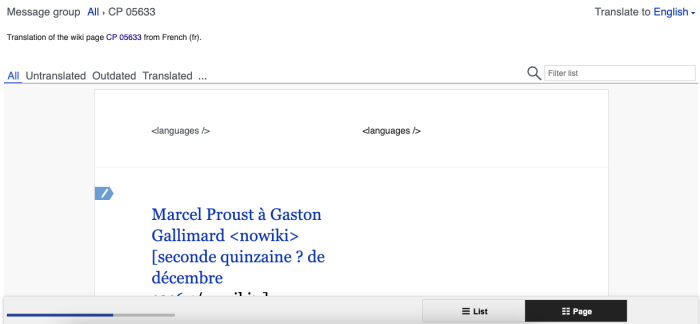
In the toolbar above the letter, "All" will be automatically selected, displaying all of the translation units that make up the letter.
- Click on "Untranslated" to display the units of text that have not yet been translated.
- Click on "Translated" to display units where a translation has already been started.
- The "Outdated" tab displays translation units where the original French text has been modified by the administrators. Click on “Outdated” to update a translation of these modified units.
3) Enter a translation
Click on the unit you would like to translate and enter your translation in the textbox below the original French text. See the image below.
It is recommended that you work on your translation in your own word processing software, then copy and paste your translated text into the wiki.
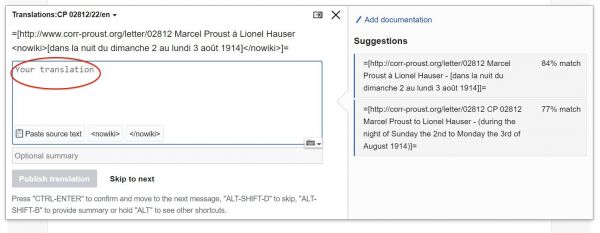
To the right, you will see suggested translations ("Suggestions") automatically generated by the MediaWiki software. The Corr-Proust Wiki does not guarantee the accuracy of these software-generated translations.
If you are working with a longer block of text, you can expand the translation box by clicking on the arrow to the left of the “X” in the top right corner of the translation box. See the images below.
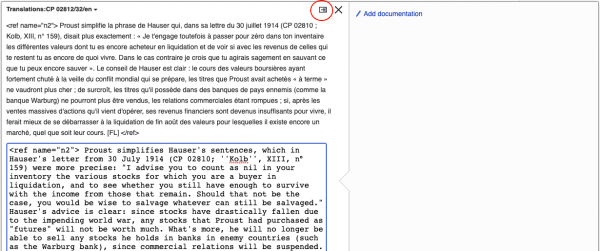

Note: The translation software will alert you if you have an uneven number of parentheses in your translation of a unit. Add or delete parentheses as needed to ensure you have an even number of parentheses in your translation of the unit before clicking on "publish."
Note: Do not indent text when entering your translation, as this will cause formatting problems.
Publish a Translation
After entering your translation for a translation unit, click on "publish translation." "Publish translation" both saves and publishes the translated text as entered for that unit. See the image below.
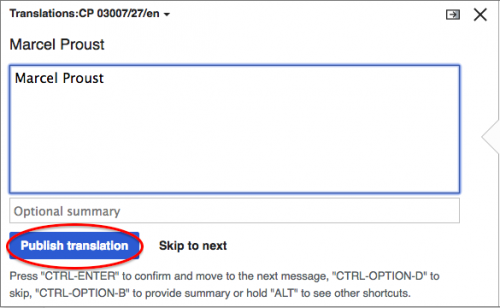
"Skip to next" takes you to the next translation unit without saving any text you have entered in the current translation unit. Therefore, if you click on "skip to next" before "publish translation," the translation you entered for that unit will not be saved.
View the published translation
If you wish to leave the translate page to view how the translation will display on the wiki, click on the letter’s number at the top of the translation page: “Translation of the wiki page CP ##### from French (fr).” See the image below.

Then, click on "English" in the language bar at the top of the letter's page to see the English translation.
Reminder: If you leave the translation page without first clicking on “publish translation" for the translation unit you are working on, the translated text for that unit will not be saved.
Once all translation units have been translated and published, your translation will be marked as "100% complete" at the top of the English translation page. A percentage of less than 100 indicates that certain sections have still not been translated.
Edit a Translation
You can return to the page and edit translations by following the steps above. As long as you have clicked on "publish translation" after working on any unit, the translations will be saved and you can return to work on them at a later time. Note that other contributors will have the ability to edit the translation in the meantime.
Partial Translations
You may choose to only translate certain parts of a letter (e.g. only certain sections of a letter, or only the letter's text but not the scholarly notes). It is recommended that you indicate on the discussion board where you left off in the translation of the letter if you would like other contributors to complete the sections that you did not.
See the Discussion Board section below for instructions on how to use this feature.
Incorporate Wikitext (Required)
Wikitext is a simple formatting language used with the MediaWiki software. When entering a translation, also enter wikitext where necessary.
Note: You must use wikitext rather than standard HTML on the Corr-Proust Wiki.
Most wikitext found in the source text will be copied and pasted directly into the translation. See the list of commonly used wikitext below for more details.
Clicking on "Paste source text" will paste the source text into the translation. You can use this function to easily and accurately paste wikitext from the source text into the translation. See the image below.
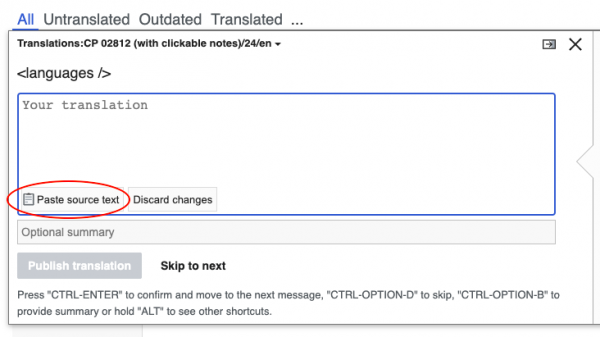
Common wikitext you will encounter while translating:
Languages bar
<languages />
- Copy and paste as is.
Link to Corr-Proust digital edition website
The text and wikitext for the link will already be pasted into the English translation for that unit. Following the color-coding in the below examples, translate the text in red (sender, recipient, and date). Do not edit the text in black, including the text between the <small> and </small> tags.
- =[https://proust.elan-numerique.fr/letter/02812 Marcel Proust à Lionel Hauser <nowiki>[dans la nuit du dimanche 2 au lundi 3 août 1914]<nowiki>]= <small>(Click on the link above to see this letter and its notes in the ''Corr-Proust'' digital edition, including all relevant hyperlinks.)</small>
- =[https://proust.elan-numerique.fr/letter/03989 René Boylesve à Marcel Proust 13 déc<nowiki>[embre 19]<nowiki>19]= <small>(Click on the link above to see this letter and its notes in the ''Corr-Proust'' digital edition, including all relevant hyperlinks.)</small>
Note: The Corr-Proust Wiki follows the usage of brackets in the Corr-Proust digital edition and in Philip Kolb’s Correspondance for dates or parts of dates that are estimated or completed by editors. Therefore, certain dates will be partially outside the brackets, or without brackets and nowiki tags at all. Do not modify the positioning of the brackets or nowiki tags.
Footnotes
==Notes==
- Copy and paste as is.
<references>
- Copy and paste as is.
<ref name="n1" />
- Copy and paste as is.
<ref name="n1"> Note 1 </ref>
- Delete "Note #" and enter the translation of the footnote in its place. See the image below.
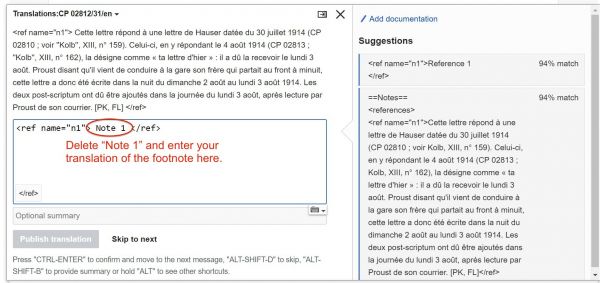
Note: Scholarly notes are numbered on the Corr-Proust Wiki in the order in which they appear in the text view of the letter in the Corr-Proust digital edition, where postscriptums (often written by Proust at the top of the first page of a letter) are placed at the end of the letter. By contrast, in the Corr-Proust digital edition, notes are numbered in the order in which they appear in the transcription view, reflecting the text as formatted in Proust’s original document.
Therefore, in certain cases the numbering order of footnotes on the Corr-Proust Wiki will differ from that found in the letter as published in the Corr-Proust digital edition (example: CP 02812 on the Corr-Proust Wiki vs. CP 02812 in the Corr-Proust digital edition).
See the Corr-Proust Wiki Cheatsheet for more information on wikitext.
Add Username to List of Contributors (Required)
The final footnote of each letter contains a list of contributors who have worked on the letter. On the translate page, click on the final footnote and add your username next to "Contributors:". Do not delete the usernames of other contributors to the letter.
- Example: "Contributors: Jsmith, Nstrole, Cbaytas"
Add Translation Notes (Optional)
In the second-to-last footnote of each letter, a space is provided to enter notes regarding the translation.
Example from the letter CP 02913: <ref name=”n7”> Translation notes: </ref>
- Enter your notes after “Translation notes:” leaving the reference tags in place.
- Include your username in brackets at the end of your notes.
Note: Translation notes should be used sparingly, only in cases where an explanatory note is crucial for reader comprehension.
Discussion Board (Optional)
This is a space for discussion between contributors and moderators about the translation of a letter or its notes. Contributors should regularly return to the Discussion page of the letter they translated to see if another contributor or moderator left translation suggestions.
To access the discussion board page for a French to English translation, first click on "English" in the languages bar at the top of the page to go to the English version of the letter. Then, in the top left corner, click on "Discussion" to open the discussion board page. See the image below.

To add a comment to the discussion board, click on "Edit" at the top of the discussion board page. See the image below.

Once you are on the "Edit" page, type in your comment. Include your username in brackets (example: [Jsmith]) at the end of your comment. Click on "Save changes" at the bottom of the page to save and publish your comment.
To add a new section to the discussion board (example: "Resources for translating financial terms" section on 02812 Discussion board), click on "Add topic" at the top of the page. Fill in the "Subject" line with the heading of your new section. Fill in the text box below with your comment. Then click on "Save changes" at the bottom of the page to save and publish your new comment. See the image below.
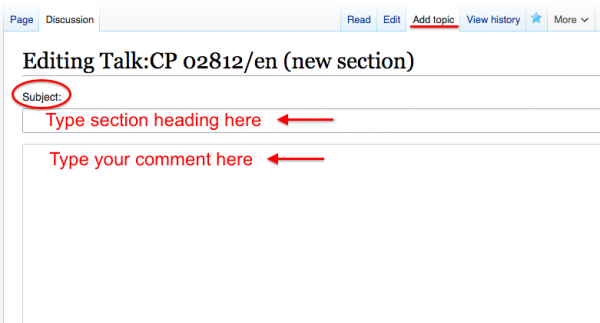
All other formatting (italics, links) must be inserted using wikitext. See the Corr-Proust Wiki Cheatsheet for more information on wikitext.
Do not delete the comments of other contributors.
Note: Make sure to click on "Save changes" at the bottom of the page to save and publish any new comment. Otherwise, your changes will not be saved when you leave the page.
Style Guide for French to English Translations
English translations can be done following either British or American English spelling conventions.
Punctuation
Do not include a space before colons or semicolons.
- Example: first word; second word (versus in French: premier mot ; deuxième mot)
Quotation Marks
Use standard English quotation marks (“ ”), versus the French guillemets found in the original texts (« »).
Do not include a space after opening or before closing quotation marks.
- Example: “example” (versus in French: « exemple »)
Place punctuation inside of quotations marks.
- Example: “example.” / “example,” (versus in French: « exemple », / « exemple ».)
Numbers
For numbers over one thousand, use commas versus spaces or periods.
- Example: 20,000 (versus 20 000 or 20.000)
Dates
“30 juillet 1919” becomes “30 July 1919” (rather than “July 30, 1919”)
Do not translate the following:
- Addresses (“44 rue Hamelin”)
- Titles of works or periodicals (Du côté de chez Swann, Le Figaro), or titles of scholarly articles or chapters (in notes). Do translate titles of newspaper articles.
- Aristocratic titles (“prince de ...,” “duchesse de ...”)
- Names of institutions (“Académie française”)
- Names of military regiments or units
Special instructions for footnotes:
The initials in brackets at the end of footnotes (e.g., [PK]) are the initials of Corr-Proust editors and must be transferred as is to the translation.
For footnote references to Philip Kolb’s print edition of Proust’s Correspondance:
- follow the format of the French reference (e.g. “Kolb, XIV, no. 160”);
- simply write “Kolb” (no italics);
- the volume number should be in roman numerals (do not write “vol.”);
- for the letter number, use the abbreviation “no.” (e.g. “no. 160”), rather than the French “n°,” or “n.” which is the abbreviation for “note.”
Do not include hyperlinks in the translation of footnotes. Users who wish to consult hyperlinks can find them in the Corr-Proust digital edition.
Useful Resources for French to English Translations
- For financial terms: Gian Balsamo, Proust and his Banker: Numerical Documentation
Moderation
Some contributors may be given the status of moderator by the Corr-Proust Wiki administrative team.
Moderators review contributions and work to resolve translation issues via the discussion board for each letter. When leaving translation suggestions on discussion boards, moderators should give contributors time to respond and modify their translations as needed. If the suggested changes have not been made after a reasonable amount of time, moderators should make the changes themselves.
Permissions
Moderators have the authority to modify or delete contributions that are inappropriate (such as spam) to the translation or discussion in question. They can also recommend that a user account be blocked.
Responsibility
As with other contributors, moderators can lose their privileges and have their user account deleted if they do not adhere to the terms and conditions outlined in the guidelines above.
To learn more about good practices of online moderation, see, for example, these Forum Moderation Guidelines written by contributors to Mozilla Support Forums.
Contact
If you have any questions about these guidelines, please fill out this contact form.
| The Corr-Proust Wiki administrative team thanks you for your time and effort in contributing to the translation of Marcel Proust’s correspondence. |